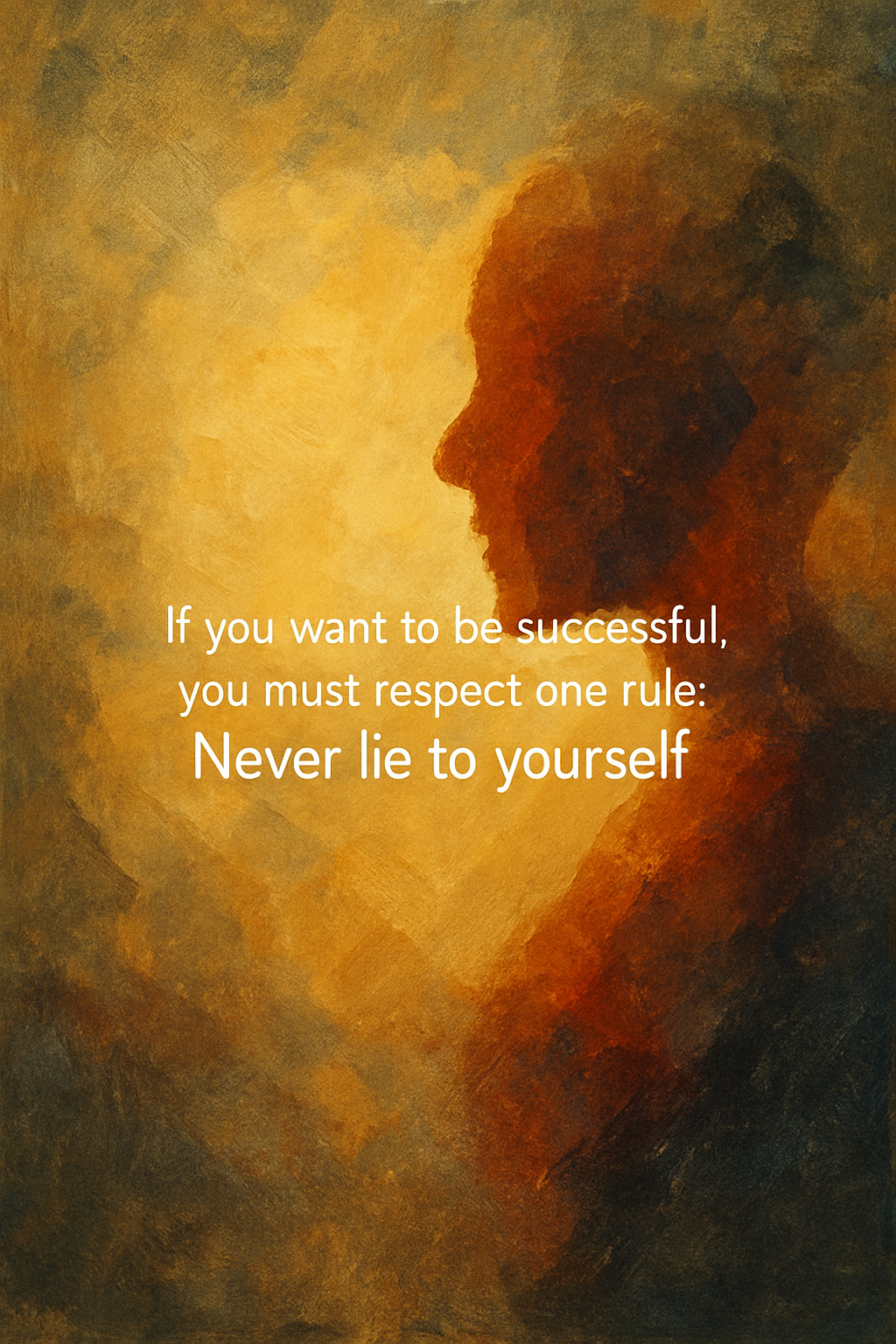Live Your Truth
True success doesn’t come from being right: it comes from being real. The most dangerous lies aren’t the ones told by others, but the ones we whisper to ourselves when our ego refuses to listen. Growth begins when we drop the armor of pride and embrace honest reflection, even when it stings. The moment we stop defending our image and start learning from truth, we unlock a deeper kind of power. One built on authenticity, humility, and self-awareness. #LiveYourTruth #AuthenticSuccess #PersonalGrowth #SelfAwareness #EgoCheck #PauloCoelho #MotivationalWisdom #InnerGrowth #TruthIsPower
ACTIONCOURAGE


11/10/25
Live Your Truth
"If you want to be successful, you must respect one rule: Never lie to yourself."
- Paulo Coelho
The hardest lies to recognize are the ones we tell ourselves. We often imagine self-deception as denial born from fear. But it can just as easily wear the mask of pride. We convince ourselves that we already know enough, that others just don’t understand, that the problem lies with them, not us. It feels safer to protect our ego than to face the discomfort of being wrong.
Yet every time we reject honest feedback, every time we silence the truth that challenges us, we trade growth for comfort and authenticity for illusion. Real success, the kind that brings peace and purpose, begins the moment we drop the pretense of perfection and dare to see ourselves clearly.
Because the truth isn’t our enemy. It’s our greatest teacher.
The Mirror of Pride
Ethan prided himself on being the smartest guy in the room. From his first internship, people noticed his confidence: he spoke with authority, worked long hours, and carried himself as if he were destined for greatness. And to his credit, he delivered results. Promotions came fast. His name began circulating in executive meetings.
But with each success, something else grew too, a quiet belief that he was above correction.
When his manager, Michael, once suggested in a review that Ethan needed to collaborate more and listen to his team’s ideas, Ethan forced a smile.
“Thanks for the feedback,” he said.
But inside, his thoughts burned: What does he know? He’s old school. He doesn’t understand innovation like I do.
Over time, this pattern hardened. Whenever someone offered critique, Ethan deflected it with clever excuses. “They’re jealous.” “They don’t get my vision.” “I’m ahead of my time.”
His ego built a fortress around him: strong, impenetrable, and utterly isolating.
Months later, a key project under his leadership began to falter. The team was exhausted, communication was broken, and deadlines slipped. Yet Ethan couldn’t see the cracks. He convinced himself that the issue was everyone else’s incompetence. “If people just listened to me,” he muttered, “this would work.”
Then one Friday evening, after a tense meeting where his proposal was rejected for the third time, Ethan lingered in the empty conference room. On the glass wall, his reflection stared back. Confident on the surface, but hollow underneath. For the first time, he saw not the brilliant innovator he imagined, but a man trapped in his own narrative.
He realized, painfully, that he had been lying to himself. His arrogance wasn’t strength. It was fear. Fear of being wrong. Fear of being seen as less than perfect.
That night, he wrote a message to his team:
"I haven’t been listening. On Monday, I’d like to hear what you really think - no filters."
It was a small act, but it cracked open the wall. In the following weeks, Ethan began to change. He sought feedback, admitted mistakes, and learned to value what others saw that he couldn’t. Slowly, his relationships mended. His team started performing again. Not because he was leading them, but because he was finally leading himself.
Ethan’s story reminds us of a truth that’s easy to overlook: Self-deception wears many masks. Sometimes it tells us we’re not good enough. Sometimes it tells us we’re better than everyone else. In both cases, it robs us of growth, joy, and authenticity.
Real success begins when we stop defending our illusions. And start listening to the truth, even when it hurts.
The Power of Inner Honesty
To “never lie to yourself” doesn’t mean you must have every answer. It means having the courage to ask the right questions:
Am I being true to my values?
Do my actions align with my purpose?
Am I hiding behind fear or excuses?
Self-honesty is the foundation of transformation. Without it, even the most brilliant talent or sharpest intellect will crumble beneath illusion. With it, every mistake becomes a steppingstone toward mastery.
But there’s a deeper layer. It is one that many people miss. When you lie to yourself, you’re not just denying the truth, you’re also distorting your own abilities. You either inflate them with pride or diminish them with doubt, and in both cases, you lose sight of who you really are and what you’re truly capable of.
The Hidden Trap: Self-Deception About Your Abilities
Coelho’s quote doesn’t just call for personal honesty. It demands personal accuracy. We deceive ourselves in two directions:
Type of Self-Deception
Self-Doubt
“I’m not good enough.”
You never attempt what you’re capable of achieving.
Self-Inflation
“I’ve already mastered this.”
You stop learning, overreach, or stagnate.
Both distort truth: One suffocates your potential through fear; the other blinds you with ego.
When you lie to yourself about your strengths, you live small. When you lie about your weaknesses, you set yourself up for painful lessons. Real growth begins when you see yourself as you are: capable, imperfect, and in progress.
True confidence isn’t pretending to know more than you do; it’s trusting that you can learn what you need. Honesty about your abilities creates clarity. And clarity unlocks power.
Living It
Honesty is not a switch you flip once; it’s a discipline you practice daily. Here’s how to bring Coelho’s wisdom to life:
Pause and Reflect Daily.
Spend five minutes each morning asking, “What do I truly feel today?” before the noise of the world drowns it out.Assess Your Abilities Honestly.
List your strengths and weaknesses without judgment. Then make a plan to improve one small area each week.Seek Feedback Fearlessly.
Ask mentors or peers to tell you what you don’t see. Truth from others is often the mirror we avoid but need most.Embrace Discomfort as Growth.
The moment you admit “I’m not there yet,” you open yourself to learning. Discomfort is not failure. It’s evolution.Act with Alignment.
Once you know your truth, even a single step in its direction has power. Say no to what drains you; say yes to what excites your soul.Celebrate Integrity.
Every time you choose authenticity over approval, pause to acknowledge it. You’ve strengthened your core.
The Liberation of Living Truthfully
When you stop deceiving yourself: about your dreams, your limits, and your worth, you unlock freedom. Freedom to pursue what truly matters to you, to love without pretense, to fail with grace, and to rise again with purpose.
Honesty isn’t just a virtue; it’s a form of power. Every truth you embrace clears away the fog that hides your destiny. And when you live truthfully, you give silent permission for others to do the same.
So today, pause, breathe, and ask yourself:
What truth have I been avoiding?
Then take one bold step toward it.
Storyteller
Paulo Coelho de Souza (born August 24, 1947, in Rio de Janeiro, Brazil) is one of the most influential writers of our time. His bestselling novel The Alchemist (1988) has sold over 300 million copies in more than 80 languages, inspiring millions to pursue their “Personal Legend,” their soul’s true calling.
Before becoming an author, Coelho worked as a journalist and songwriter. A transformative pilgrimage along Spain’s Camino de Santiago in 1986 awakened his spiritual purpose and reshaped his life. His later works: Brida, The Valkyries, The Witch of Portobello, explore courage, destiny, and the mystical power of truth.
